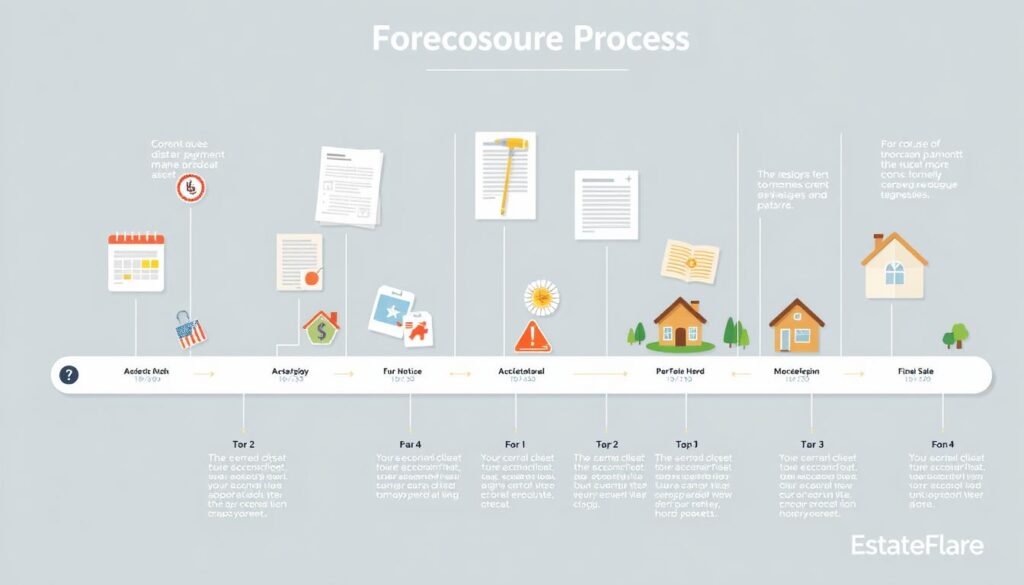In 2022, over 1.3 million foreclosure filings happened in the United States. This is a 57% jump from the year before. The foreclosure crisis is complex and scary for homeowners and investors alike. We’ll walk you through the foreclosure journey, from default to after the auction. You’ll learn how to buy foreclosed properties and deal with legal issues.
Key Takeaways
- Understanding the foreclosure process, including mortgage default, pre-foreclosure notice, and foreclosure laws and procedures.
- Preparing for a foreclosure auction by researching properties and checking liens.
- Navigating the post-auction redemption period and handling deficiency judgments.
- Exploring foreclosure alternatives, such as loan modifications and forbearance agreements.
- Conducting due diligence and inspections when buying a foreclosed property.
Understanding the Foreclosure Process
Foreclosure is a complex legal process that affects homeowners and real estate investors. It’s important to know the key stages, starting with mortgage default and the pre-foreclosure notice.
Mortgage Default and Pre-Foreclosure Notice
When a homeowner misses mortgage payments, they’re in default. This leads to a pre-foreclosure notice from the lender. It warns that foreclosure might start if payments aren’t made within 30-90 days.
Foreclosure Laws and Procedures
Foreclosure laws and procedures vary by state. Homeowners facing foreclosure need to know their state’s laws. This helps them understand their rights and options.
Some important foreclosure laws and procedures include:
- The timeline for the foreclosure process
- The required notices and court filings
- The homeowner’s rights during the foreclosure process
- The potential for a deficiency judgment after the foreclosure sale
Knowing about mortgage default, pre-foreclosure notice, and foreclosure laws helps both homeowners and investors. It makes it easier to navigate the foreclosure process and make smart decisions.
Preparing for a Foreclosure Auction
When a property goes into foreclosure, it’s sold at a public foreclosure auction. Going to these auctions can help you buy real estate at lower prices. But, you need to be ready. It’s important to research properties well and check for any liens.
Researching Properties and Checking Liens
Before you go to a foreclosure auction, learn as much as you can about the properties. Look at the property’s history, its condition, and any problems it might have. Also, do lien checks to find out if there are any debts or claims on the property. These can affect your purchase.
- Find out about the foreclosure auction properties, like their address, size, and any known issues.
- Look at public records to learn about the property’s past, including its previous owners, sale prices, and liens or encumbrances.
- Try to see the property to check its condition and find out if it needs repairs or renovations.
- Talk to a real estate lawyer or expert to make sure you understand the property research and lien checks well.
By doing your homework on the properties and checking for liens, you’ll be ready to make smart choices. This will help you avoid problems during the foreclosure auction process.

“The key to success in a foreclosure auction is preparation. Thorough property research and lien checks can help you avoid costly surprises and maximize your chances of acquiring a valuable asset.”
| Property Research Checklist | Lien Check Considerations |
|---|---|
|
|
Attending a Foreclosure Auction
Going to a foreclosure auction can be thrilling and profitable. But, it needs careful planning and knowing how to bid. Here are some important tips to keep in mind:
Registration and Pre-Auction Research
First, you must register and get a bidder number. You’ll need to show proof of funds or a deposit. Also, research the properties well. Look for any liens or title problems that might affect your purchase.
The Bidding Process
- Listen carefully to the auctioneer’s rules and how much to bid.
- Be ready to bid fast when your chosen property is up for sale.
- Stay within your budget and don’t let the competition pressure you.
- Know the auction’s rules, as they can change from one to another.
To win at a foreclosure auction, you need good research, financial readiness, and calmness. Follow these tips to confidently bid and maybe find a great real estate deal.
| Tip | Description |
|---|---|
| Research Properties | Look into the properties, including any liens or title issues. |
| Set a Budget | Decide how much you can spend and stick to it, no matter what. |
| Understand Auction Terms | Read the auction’s rules, as they can differ from one to another. |
By using these tips and staying focused, you can boost your chances of winning a foreclosed property at an auction.
The Foreclosure Process
The foreclosure process is complex and varies by state and situation. Homeowners facing foreclosure can expect a general timeline. Let’s look at the key milestones and legal steps in the foreclosure process.
When a homeowner misses mortgage payments, the lender sends a pre-foreclosure notice after 90 days. This notice warns the homeowner of foreclosure and gives a chance to catch up or find alternatives.
If the homeowner can’t resolve the issue, the lender starts the foreclosure filing process. This can take months to over a year, depending on the state’s laws.
- The lender must give the homeowner a formal notice of foreclosure during this process.
- The homeowner can respond to the notice and try to negotiate with the lender.
- If the foreclosure continues, the property goes to a foreclosure auction. It’s sold to the highest bidder.
The foreclosure process is tough and emotional for homeowners. Knowing the timeline and steps can help them navigate and find ways to save their home.
| Stage | Timeline | Key Events |
|---|---|---|
| Pre-Foreclosure | 90 days after missed payment |
|
| Foreclosure Filing | Varies by state (3-12 months) |
|
| Foreclosure Auction | Varies by state |
|

Remember, the foreclosure process is complex. It’s crucial for homeowners to stay informed and explore all options to protect their homes.
Post-Auction: Redemption Period and Deficiency Judgments
After a foreclosure auction, important legal steps must be taken. It’s key to understand the redemption period and how to handle deficiency judgments. This is crucial for both buyers and former homeowners.
Understanding the Redemption Period
The redemption period is a time for the previous homeowner to get their property back. They can do this by paying the auction price, plus extra costs and fees. The length of this period varies by state, so knowing the local laws is vital.
Dealing with Deficiency Judgments
When the foreclosure sale doesn’t cover the mortgage debt, the lender might ask for a deficiency judgment. This lets them get the remaining debt from the former homeowner. Deficiency judgments can affect finances for a long time, so it’s important to know your rights and duties.
Handling the post-auction phase well needs a deep understanding of local laws and a proactive mindset. By staying informed and getting professional help, both buyers and former homeowners can make smart choices. This helps reduce the effects of foreclosure.
Foreclosure Alternatives for Homeowners
Homeowners facing foreclosure might feel lost, but there are options. Loan modifications and forbearance agreements can be lifesavers. They help avoid the worst of losing a home.
Loan Modifications
Loan modifications change your mortgage terms. This could lower your interest rate or extend your repayment time. It makes paying your mortgage easier. Lenders might agree to these changes to avoid foreclosure costs.
Forbearance Agreements
Forbearance agreements let you pause or lower payments for a while. This gives you time to get back on your feet. It’s great for those facing short-term financial issues, like job loss.
Homeowners should talk to their lenders fast when facing foreclosure. Options like loan modifications and forbearance agreements can save your home. They offer a chance to keep your family safe and stable.

Tips for Buying a Foreclosed Property
Buying a foreclosed property can be a great chance, but it has its own hurdles. We’ll share tips on doing your homework, checking the property, and getting through the foreclosure process.
Conducting Due Diligence and Inspections
It’s key to do your homework on a foreclosed property. First, look into the property’s past, like any debts or liens. Then, check the title and do a detailed property inspection to spot any problems or repairs needed.
- Get a home inspector to check the property’s condition, like the structure, plumbing, electrical, and HVAC.
- Get a professional appraisal to see if the property’s worth what you’re paying, so you don’t overpay.
- Look at any permits or zoning rules to make sure the property fits your plans.
By doing your homework and inspections, you can make a smart choice and avoid problems when buying foreclosed properties.
“Proper due diligence is the key to a successful foreclosure property acquisition. Take the time to uncover all the details, and you’ll be well on your way to a smart investment.”
The foreclosure process is complex, so be careful and thorough. Follow these tips to overcome the challenges and find a good foreclosed property.
Foreclosure Prevention Strategies
Dealing with the threat of foreclosure can feel like a heavy burden. Yet, there are steps you can take to avoid this serious situation. By focusing on foreclosure prevention and foreclosure avoidance, you might find a way to keep your home.
Talking openly with your lender is a key step. Many lenders want to help homeowners find solutions. They might offer loan modifications or forbearance agreements to lower payments or give you more time to pay.
- Seek help from a HUD-approved housing counselor. They can guide you and help talk to lenders.
- Learn about your mortgage rights and look into government and private programs for help.
- Make sure to pay your mortgage first by cutting back on other expenses and using what you have.
Be careful of companies that promise to save your home but might scam you. Always get professional advice and take action early. This way, you can try to prevent foreclosure and keep your home.
| Foreclosure Prevention Tip | Benefits |
|---|---|
| Communicate with lender | Explore loan modifications, forbearance agreements, and other solutions |
| Seek housing counseling | Receive guidance and assistance in negotiating with lenders |
| Prioritize mortgage payments | Maintain home ownership and avoid foreclosure |

“The key to foreclosure prevention is proactive communication and a willingness to explore all available options. With the right approach, many homeowners can find a path to avoid the devastating consequences of foreclosure.”
Working with a Real Estate Agent
Dealing with the foreclosure market can be tough. But, having a real estate agent who knows what they’re doing can really help. They can guide you, whether you’re facing foreclosure or looking to buy foreclosed properties.
Benefits of Hiring a Foreclosure Specialist
Real estate agents who focus on foreclosures know the laws and procedures inside out. They can help you deal with lenders, explore short sale options, and understand the local market. Their knowledge is key to helping you avoid foreclosure or find great deals on foreclosed properties.
These specialists also offer emotional support. They know how stressful and overwhelming foreclosure can be. They provide a caring and understanding approach to help you get through it.
“Working with a foreclosure specialist was the key to navigating the complex foreclosure process. Their expertise and support were instrumental in helping me avoid losing my home.”
Working with a foreclosure specialist can be a game-changer. They offer valuable knowledge, negotiation skills, and emotional support. This can greatly improve your chances of a positive outcome, whether you’re facing foreclosure or looking to invest.
Financing Options for Foreclosed Properties
Buying a foreclosed property often needs special financing. As investors, we have many ways to get the funds we need. This lets us take advantage of these unique real estate chances.
Investment Loans
Investment loans are a common choice for foreclosed properties. They offer good interest rates and flexible terms. Unlike regular mortgages, these loans let us put down less money. This saves our capital for other investments.
Cash Purchases
For those with enough money, buying with cash is appealing. It lets us get a property at a lower price. We also avoid loan fees and interest costs.
Creative Financing Strategies
There are also creative ways to finance foreclosed properties. We can use crowdfunding, joint ventures, or even seller financing. These options help us tailor deals to fit our financial situation and goals.
| Financing Option | Advantages | Disadvantages |
|---|---|---|
| Investment Loans |
|
|
| Cash Purchases |
|
|
| Creative Financing Strategies |
|
|
Exploring investment loans and foreclosed property financing is key. We must pick the best option for our goals and finances. By looking at these different financing options, we can fully use the foreclosure market. This helps us build a strong, varied real estate portfolio.

Navigating Legal Challenges in Foreclosures
Foreclosures can be complex, and a real estate attorney is crucial. They protect homeowners’ interests and guide through legal hurdles. This is vital during the foreclosure process.
Hiring a Real Estate Attorney
It’s wise to hire a real estate attorney when facing foreclosure. They offer insights and help understand your rights. They can:
- Review foreclosure documents for legal compliance
- Negotiate with lenders for better terms
- Represent you in court to defend your rights
- Guide on redemption periods and deficiency judgments
With a real estate attorney, you can tackle foreclosure challenges better. This increases your chances of a positive outcome.
| Benefit | Description |
|---|---|
| Legal Expertise | Real estate attorneys know foreclosure laws well, protecting your rights. |
| Negotiation Skills | They can negotiate with lenders for better terms or solutions. |
| Court Representation | They represent you in court, defending your interests and exploring legal options. |
| Guidance and Support | They offer valuable guidance and support, helping you make informed decisions. |
Dealing with foreclosure legal challenges can be tough. But, with a skilled real estate attorney, you can protect your rights and explore options.
SELLING REAL ESTATE WITHOUT AN AGENT
Foreclosure Investing: Risks and Rewards
Foreclosure investing can be very profitable for those who know what they’re doing. But, it also has its risks. We can buy properties at low prices, which could lead to big gains. Yet, the foreclosure process is complex and needs careful research and legal knowledge.
Before starting, it’s important to think about the good and bad sides. Doing thorough research is key. We need to check the property’s condition, any liens, and the local market. Unexpected costs, like repairs or legal issues, can hurt our profits if we’re not ready.
Going through the foreclosure process takes patience and a smart risk-taking approach. By staying updated, working with experts, and being cautious, we can enjoy the benefits while avoiding big risks. Making this investment choice should be well thought out, with a focus on managing risks well.



